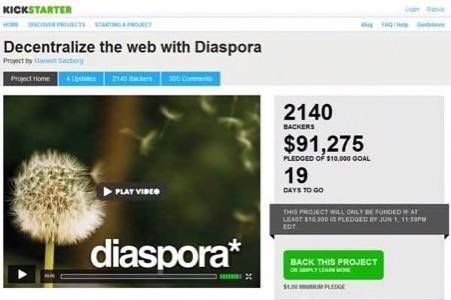Since we broke the story about the Diaspora Project last week, the plans for an open source, distributed alternative to Facebook has seen widespread press. But just as importantly, funding for the undertaking has skyrocketed.

The Diaspora Project is the brainchild of four NYU computer students, and as Sarah Perez noted in her article, while the concepts of “open source” and “distributed network” might not normally have mass appeal, the latest round of privacy concerns with Facebook have helped to generate a lot of attention for the project and the concepts behind it.
The project is currently being hosted on Kickstarter, a site that lets entrepreneurs crowdsource funding. Kickstarter allows entrepreneurs to set a funding goal and deadline, as well as offer an optional set of rewards to their backers. Projects that don’t reach that goal have their pledges returned.
In Kickstarter’s words, the service demonstrates that “good idea, communicated well, can spread fast and wide” and that “a large group of people can be a tremendous source of money and encouragement.”
Last week, Diaspora was $2000 short of their $10,000 goal with under a month left to go until reaching their deadline. Yesterday, when Techcrunch wrote about the project, funding stood at around $60,000. As of this morning, they have raised over $90,000 from over 2100 backers, including some fairly big names in the tech industry, and still have 19 days of fundraising to go.
Kickstarter offers a sliding scale, of sorts, for donations, and most of the funding for the Diaspora Project has come in small amounts. While 4 backers have pledged over $2000, most backers have opted to donate $5, $10, or $25. The latter has been the most popular donation amount, with almost 900 individuals committing $25. That $25 will get you a CD, some stickers, and a t-shirt – and the satisfaction of helping support a Facebook alternative.
While certainly the Diaspora Project is well-timed, their use of the Kickstarter platform also points to the power of crowdsourced microfunding – particularly for a project that many people outside typical investment circles are finding compelling and important.






















